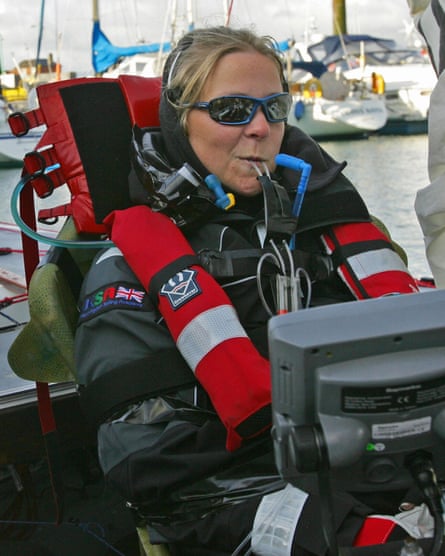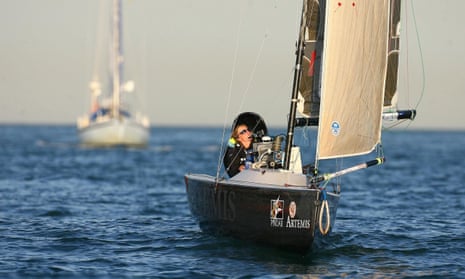Hilary Lister was a record-breaking sailor who became the first quadriplegic person to sail alone across the English Channel. She has died aged 46, following an infection related to reflex sympathetic dystrophy, the degenerative nervous system disorder she had lived with for all of her adult life.
On 23 August 2005, with a map strapped to her foot, and a support boat following behind, she completed the 21-mile crossing from Dover to Calais in six hours and 13 minutes, navigating with her mouth. Four years later, she became the first disabled woman to sail around the UK, an achievement described by the International Sailing Federation as ranking her among the top four sailors in the world. Her journey was captured in a BBC2 documentary, A Race Against Time: Hilary Lister’s Round Britain Dream (2013).
Using “sip and puff” technology, sending air pressure signals by inhaling and exhaling through plastic straws – the same model with which she operated her wheelchair – Lister was able to steer her boat despite being immobile from the neck down. One straw operated the tiller, controlling the direction of the boat, the other the winches – letting the sails in or out. She placed her tongue over the straw that wasn’t in use. Strapped into the boat, she was unable to use the bathroom for the duration of the sail.
Frequently she risked her life. As she struggled to breathe, her support crew had to resuscitate her six times during her record-breaking circumnavigation of the British Isles. She believed that the risk was worthwhile – essential even. “I want to get able-bodied people to rethink their views about the disabled,” she said. “We do not need wrapping up in cotton wool and can go out and do silly or dangerous things if that’s what we want to do.”
She liked to emphasise the beauty, awe and humour in her adventures – joking about finding herself in the middle of a pod of breaching whales in the Irish Sea, or enthusing about the sensation of her boat moving through the waves.
Born in Hook, Hampshire, Hilary was the third of four children. Her mother, Pauline, was a biochemist at Oxford University, her father, Colin Rudd, a vicar. Growing up as an able-bodied child, Hilary led an active life: she captained the netball and hockey teams at school, and enjoyed playing rugby. It was not until the age of 11 that she began to experience the symptoms of reflex sympathetic dystrophy; by 15 she was using a wheelchair.

After leaving King’s school, Canterbury, Hilary studied biochemistry at Jesus College, Oxford, graduating in 1995. A keen musician, she gave clarinet lessons until she lost the use of her hands. She was forced to give up a PhD at the University of Kent because of her increasing loss of mobility. By the age of 27 she was paralysed from the neck down. In 1999, she married Clifford Lister, a music teacher, from whom she was later separated.
Her illness severely restricted her life. “I get put on the sofa by one carer at 9am and taken off by another carer at 7pm and put to bed,” she once said. Lister found the boredom and frustration intolerable. With it came agonising pain which she described as akin to rasping sandpaper on her joints or knives piercing her. At one point she decided to end her life. “I couldn’t wash or feed myself or do any of the basic things in life. I was in very bad place where I was assessing the quality of my life and wondering whether it was worth continuing.”
Discovering sailing in 2003 changed everything, when a friend introduced her to Westbere Sailing Opportunities, near Canterbury. “I just love being completely alone on the water. The whole point is having that complete freedom to control your own destiny,” she said. “In my boat I’m finally out of my chair, and I feel like I’m flying. Sailing has given me back a sense of freedom I never thought would be possible. It has, quite literally, saved my life.”
After meeting Emma Richards, the youngest person to complete the Around Alone single-handed round-the-world yacht race (now known as the Velux 5 Oceans Race), Lister soon set herself the challenge of crossing the English Channel on her own. Richards introduced Lister to Andrew Pindar, a businessman who went on to sponsor her first boat, and the dream became a reality.
Her feats won her multiple awards, including the Sunday Times Helen Rollason award for inspiration in 2005, and the Cosmopolitan Superhero award in 2007.
In 2010 Lister set up Hilary’s Dream Trust with the aim of providing access to sailing for adults with disabilities, or those experiencing economic barriers. In 2014 she undertook her last major voyage, crossing the Arabian Sea, this time with a crew for support. In her final 18 months, she was no longer able to sail.
She is survived by Clifford, her parents and three brothers.

Comments (…)
Sign in or create your Guardian account to join the discussion